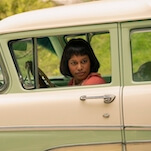Shockaholic is often funny, though more often in random, scattered asides than when Fisher actually sets out to pile on the jokes. Talking about her weight gain, she devolves into Borscht Belt style wacky one-liners—”I was throwing good calories after flab,” and “I took pounds and pounds of medications that have the dual effect of causing water retention (think ocean, not lake) while also creating a craving for salad—chocolate salad.” But even amid the corniest gags, she offers smart observations: All the weight-gain self-ribbing comes amid a frustrated acknowledgement that by becoming a geek pinup and lust object as a metal-bikini-wearing twentysomething in Return Of The Jedi, she was “signing an invisible contract to stay looking the exact same way for the next thirty to forty years.” Talking about a surprise dinner with Ted Kennedy, who asked her unnervingly graphic sexual questions, Fisher comes across as entertainingly game, fearless, and aware of the difference between public and private power, while still acknowledging her uncomfortable role as celebrity arm candy and conquest material for her date, Senator Chris Dodd.
Fisher’s life certainly provides a wealth of colorful anecdotes, for instance about the public romance between her famous parents, Debbie Reynolds and Eddie Fisher, and the latter’s eventual defection to a relationship with Elizabeth Taylor. Carrie Fisher’s adult meetings with Taylor illustrate a point the book never directly addresses, but often touches on: Celebrities can be extremely strange, due to their isolation. Fisher’s distanced friendship with Michael Jackson, chronicled in careful detail here, suggests the same conclusion. (Her dentist, the first man to openly accuse Jackson of molesting his son, draws the book’s sternest condemnations, apart from those aimed at Fisher herself.)
But the real gold of the book comes in Fisher’s ruthlessly self-abnegating sense of humor, which refuses pity, or even much serious focus on her troubles. There’s a sense, at times, of a much larger pain underlying the gags, particularly over her depression-damaged relationship with her daughter, and her reunion with her drug-loving, dying father. (In a typically self-deflating move, Fisher reproduces family photos and relevant magazine covers, but gives them absurd captions like “Map of Singapore forest rails, empowering local community to achieve sustainable development,” and “X-rays of the lower mandible of female dolphin.”) The material would work better as an audiobook or stage show—in print, it occasionally comes across as Dave Barry-esque absurdism, straining for wackiness, where a personal delivery would make it more natural. But few things seem to have been natural in Fisher’s life, and the wealth of her experience is almost as much of a draw as her rare, welcome self-awareness and openness to self-mockery.









































